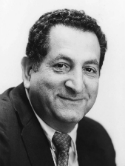Role of E2F-1 in chemosensitivity Journal Article
| Authors: | Banerjee, D.; Schnieders, B.; Fu, J. Z.; Adhikari, D.; Zhao, S. C.; Bertino, J. R. |
| Article Title: | Role of E2F-1 in chemosensitivity |
| Abstract: | The E2F family of transcription factors, in partnership with DP proteins, is thought to regulate transcription of genes that encode protein products that are required for DNA synthesis, which include important cancer chemotherapeutic targets such as thymidylate synthase and dihydrofolate reductase. This study was conducted to investigate the effects of overexpression of human E2F-1 cDNA on chemosensitivity in a human fibrosarcoma cell line, HT-1080. The E2F-1-overexpressing HT-1080 cells had a shorter doubling time both in vitro and in vivo. Associated with an up- regulation of TS, E2F-1-transfected cells were more resistant to 5- fluorouracil than were untransfected cells. These E2F-1 transfectants, although resistant to fluoropyrimidines and serum deprivation, were more sensitive to etoposide, doxorubicin, and SN38 (the active metabolite of irinotecan) but not to Taxol. |
| Keywords: | human cell; dna-binding proteins; doxorubicin; antineoplastic agents; drug targeting; paclitaxel; dna synthesis; cell cycle proteins; cell survival; cell cycle; cell division; antimetabolites, antineoplastic; protein targeting; etoposide; antineoplastic agents, phytogenic; camptothecin; cancer cell culture; tumor cells, cultured; chemosensitivity; transfection; transcription factors; gene expression regulation; cloning, molecular; transcription regulation; fibrosarcoma; transcription factor e2f; carrier proteins; recombinant proteins; tetrahydrofolate dehydrogenase; transcription factor dp1; e2f1 transcription factor; culture media, serum-free; e2f transcription factors; humans; priority journal; article |
| Journal Title: | Cancer Research |
| Volume: | 58 |
| Issue: | 19 |
| ISSN: | 0008-5472 |
| Publisher: | American Association for Cancer Research |
| Date Published: | 1998-10-01 |
| Start Page: | 4292 |
| End Page: | 4296 |
| Language: | English |
| PUBMED: | 9766655 |
| PROVIDER: | scopus |
| DOI/URL: | |
| Notes: | Article -- Export Date: 12 December 2016 -- Source: Scopus |
Citation Impact
MSK Authors
-
 136
136Banerjee -
 13
13Adhikari -
 363
363Bertino -
 42
42Zhao -
 12
12Schnieders
Related MSK Work


